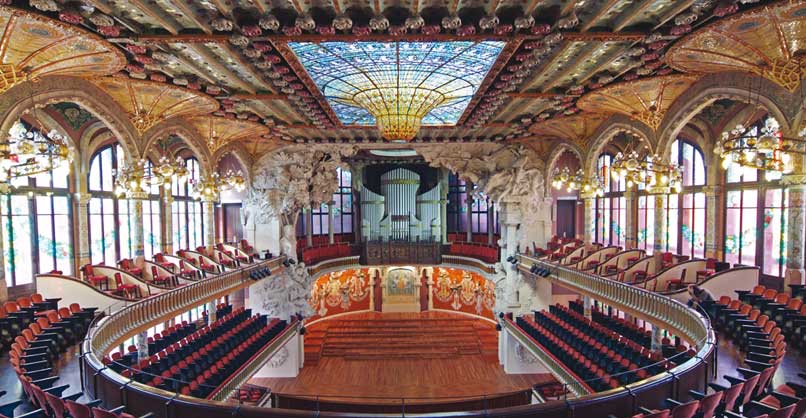The architect Lluis Domenech i Montaner is the father of Catalonian "Modernismo," and the Palau de la Music a Catalana is his masterpiece. Together with Gaudi, Domenech i Montaner is a representative of the mixture of nationalism and unbridled invention that characterizes turn-of-the-century art in Barcelona, the equivalent of, for example, the French and Belgian "Art Nouveau", the Austrian "Jugendstil" and the English "Modern Style".
In 1891, Lluis Millet and Amadeu Vives founded the Orfeô Català, a chorale that performs both the Catalonian popular repertoire and serious polyphonic music. The succès of the chorale was such that they asked Domenech i Montaner to design office space and a concert hall for them. Up to this day, the Palau, inaugurated in 1908, has marked Barcelonas musical history. Amidst the building's coloured mosaics and its countless floral motifs, the Catalomans came legion to hear their Orfeö perform Bach's ST. MATTHEW PASSION (Catalonian premiere in 1921) and Beethoven's MISSA SOLEMNIS (performed to commemorate the centennial of his death in 1927). To mark these events, sculptures and bus reliefs were added to the already exuberant decoration. In the building's smaller chamber music theatre, as well as in the larger 2000-seat hall, with its luminous and extravagant glass ceiling in the form of an inverted coupola, the century's most prestigious artists have come to perform.
In 1921, for example, during the famous performance of Bach's PASSION, Albert Schweitzer played the German organ that is part of the hall's hemicycle (unfortunately, this organ has been abandoned since being poorly restored in 1973). Much to the architect's credit, the Berlin Philharmonic under Karajan's baton, as well as artists such as Rubinstein, Oistrakh, and Menuhin, not to mention the famous Catalonian singers Montserrat Caballé and Victoria de Los Angeles (locally called "dels Angels"), have kept alive this extraordinary edifice, that could be visited as a museum.
Declared a historical monument in 1971. the Palau was restored and extended between 1982 and 1989. In 1991-92, Orfeö Catalä's centennial celebrations, Barcelona again established its position amongst the world's major theatres, for Giulini, Temirkanov, Colin Davis, Muti, Mehta, Barenboim, and several others came here to conduct the Philadelphia, Leningrad, Berlin, Montreal, Dresden and London symphony orchestras.











